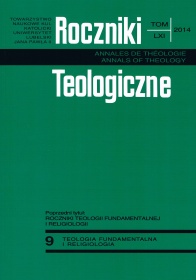Interiorism in Theology of Religions and the Jewish-Christian Relationship
Abstract
Interiorism in theology of religions, a term coined to describe an alternative to exclusivism, inclusivism and pluralism, is a way of establishing the theological relationship of the Christian message with non-Christian religions, which goes beyond these usual models. The author of this article grasps the canonical relationship between the two biblical Testaments as a theological paradigm to define the relationship of Christian religion with the other religions. Interiorism can avoid an attitude of superiority of Christian religion towards the other religions (e.g. exclusivism, inclusivism), as well as a relativization of the Christian truth-claims (pluralism). Christian interiorism thus recognizes other religions to be not only depositaries of a partial or relative truth, but also of an insuperable truth. His methodological starting point is a radical problematization of the concept of divine revelation due to the philosophical understanding according to which the ontological relation between the creation and God is merely unilateral (St. Thomas Aquinas, Peter Knauer). Christian religion provides an answer for this fundamental problem through its Trinitarian concept of God. Only through the latter a real relationship between God and the world can be thought about without running into a contradiction. In this way the concept of “Word of God” reveals its understandable sense turning the message of Israel's Holy Scriptures universally understandable as Old Testament. This hermeneutical relation between the biblical Testaments can be – mutatis mutandis – extended to other religions. The present work highlights this and other assumptions of theological interiorism. It eventually enters into the debate about critical objections concerning the Jewish-Christian relationship, which accuse interiorism of not respecting the uniqueness of this relationship. This article indeed aims to emphasize that the uniqueness of the Jewish-Christian relationship consists precisely in indicating the right way to relate ourselves to the other religions.
References
Childs B.S.: Die Theologie der einen Bibel 2, Freiburg 1996.
Gäde G.: Christus in den Religionen. Der christliche Glaube und die Wahrheit der Religionen, Paderborn 22010.
Gäde G.: Interiorismus – ein Vorschlag für einen Ausweg aus der religionstheologischen Sackgasse, in: ThG 46(2003) 14-27 [polnisch: Interioryzm – propozycja wyjścia z religijno-teologicznej ślepej uliczki, in: „Studia Oecumenica” 7(2007) 217-234].
Gäde G.: Islam in christlicher Perspektive. Den muslimischen Glauben verstehen, Paderborn 2009.
Geffré C.: Croire et interpréter. Le tournant herméneutique de la théologie, Paris 2001.
Höhn H.-J.: Gott – Offenbarung – Heilswege. Fundamentaltheologie, Würzburg 2011.
Knauer P.: Der Glaube kommt vom Hören. Ökumenische Fundamentaltheologie, Freiburg 61991.
Knauer P.: Christus in den Religionen– Interiorismus, Dialog, Pluralismus, in: Polykarp Ulin Agan SVD (Hg.), Pluralistische Religionstheologie und Mission, Nettetal 2011, 81-106.
Rahner K.: Das Christentum und die nichtchristlichen Religionen, in: Schriften zur Theologie 5, Einsiedeln 21964, 136-158.
Rahner K.: Jesus Christus in den nichtchristlichen Religionen, in: Schriften zur Theologie 12, Einsiedeln 1975, 370-383.
Rutishauser Ch.M.: Jewish-Christian Dialogue and the Theology of Religions, in: „Studies in Christian-Jewish Relations”, hg. V. Center for Christian-Jewish Learning at Boston College, vol. 1(2005-2006) 53-66.
Wohlmuth J.: Das exzeptionelle Verhältnis von Judentum und Christentum und der interreligiöse Dialog, in: J. Rahner, M. Schambeck (Hgg.), Zwischen Integration und Ausgrenzung. Migration, religiöse Identität(en) und Bildung – theologisch reflektiert, Bamberger Theologisches Forum 13, Münster 2011, 139-156.
Copyright (c) 2014 Roczniki Teologiczne

This work is licensed under a Creative Commons Attribution-NonCommercial-NoDerivatives 4.0 International License.





